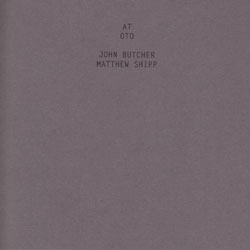
While Butcher, better known for his work with both European free improvisers and denizens of the electro-acoustic improve world does occasionally collaborate with musicians from the American avant-jazz scene, it was still intriguing, to say the least, to see that he'd teamed up with Matt Shipp, not a duet that would have normally come to mind.
That said, the basic structure of the disc, recorded live at London's Caf� Oto, comes as something of an initial disappointment, divided approximately in half, time-wise, between two solo pieces by Butcher (one each on tenor and soprano, both played without electronic adaptation, btw), one by Shipp and a near half hour duo performance. And, as it happens, the solo works are the more rewarding. Butcher's solos are fine, the tenor robust, rippling and complexly concentrated, the soprano squeezed to within an inch of its life, allowed to burble and wheeze, drifting into tightly controlled overtones. They're both very strong pieces, if not all that different from numerous other examples of his music available elsewhere. Shipp's 15-minute improvisation is also quite rich, a turbulent piece wherein the jazz allusions are oblique, recalling pianists from Monk to Muhal Richard Abrams, but managing to straddle a divide between liquid melodic phrasing and an overall astringency. He works low on the keyboard but never opts for easy rhythms or tonalities, still retaining traces of Taylor but not nearly as indebted to him as he once was. A very fine set that serves to leave the listener anxious for the pairing.
Well, the duo is something of a mixed bag. It begins strongly enough, both musicians vociferous, Butcher's throaty tenor mixing well with the continued plumbing of deep tones by Shipp, bringing to mind Taylor's 60s work like "Unit Structures" in terms of its form. But when the music becomes sparer, when there's less occupied space in which to hide, a certain routineness sets in and it begins to sound like your randomly chosen Emanem release. The music is forceful but with more vehemence than thoughtfulness. Fans of this aspect of free improvisation may welcome this approach and blissfully wallow in it but those who enjoy the more contemplative, incisive Butcher could find it excessively ornate and indulgent. It's a start, though; perhaps next time around they'll investigate a quieter corner.
Comments and Feedback:
|



